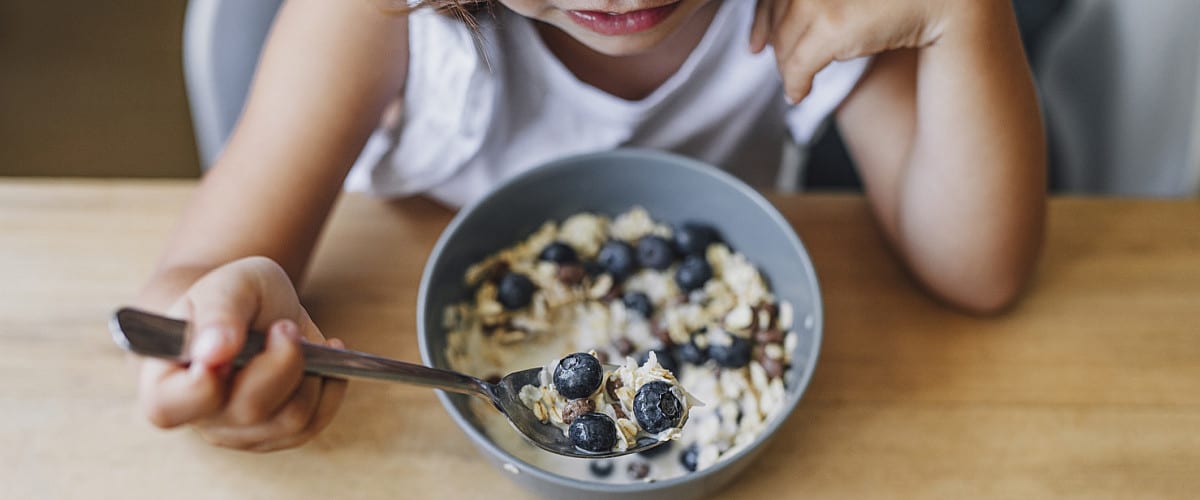Breakfast has long been touted as the most important meal of the day, and especially for kids. Research points to a whole host of potential benefits for children when they eat a well-balanced breakfast, including more energy and better focus at school.
But for many families, mornings are hectic. There are late wake-ups and forgotten, last-minute homework assignments to contend with. Often families are rushing out the door. It’s not uncommon for breakfast to be a harried affair, with kids eating the meal on the run—or sometimes not at all.

Lauren Crain, Registered Dietitian Nutritionist
In fact, according to recent data from the U.S. Centers for Disease Control and Prevention, three out of four American high school students said they didn’t eat breakfast daily in 2021. It’s a significant problem, says Lauren Crain, a dietitian working to empower students to start the day right across her large school district, because, yes, breakfast is indeed critical.
“We are literally breaking our fast from sleeping overnight,” says Lauren. “It doesn’t matter as much when we eat our breakfast, but what we eat for breakfast is really important. A balanced meal with carbs, healthy fat, and protein can give your child a boost in energy and clarity to jumpstart their day.”
In this installment of our “What’s a Parent to Do” blog series, Lauren helps us to navigate the challenges of getting kids to eat a healthy first meal of the day.
Q: Why is breakfast the most important meal of the day?
Our bodies use glucose, or a simple sugar we get from food, as fuel. We store it in our liver and it’s released as needed for energy. When glucose gets depleted after a night of rest—typically that happens by mid-morning—we feel hungry and fatigued. Some people call that feeling “hangry.”
It can be pretty hard to concentrate when your energy is low and your stomach is rumbling. Breakfast is critical to refuel the body for a successful day, and it provides kids with key nutrients. That first meal of the day is a great opportunity to get fiber, protein and carbs—key components of a healthy diet.
If children miss these at breakfast, that puts more pressure on lunch and dinner to deliver. It can be hard for them to catch up and get on track to a day of balanced nutrition.
Q: What makes breakfast so important for kids?
 Kids who eat breakfast are more likely to concentrate well, have energy to put toward their studies, and even handle frustration better. Studies even show kids who have breakfast are more likely to meet their overall nutritional needs, and less likely to become overweight because they’re not reaching for unhealthy foods later in the day.
Kids who eat breakfast are more likely to concentrate well, have energy to put toward their studies, and even handle frustration better. Studies even show kids who have breakfast are more likely to meet their overall nutritional needs, and less likely to become overweight because they’re not reaching for unhealthy foods later in the day.
That’s key because obesity could lead to issues down the road, including increased risk of diabetes.
“Kids have to get up early and use their brains to learn in school,” Lauren says. “Not only that, but they’re growing which ups their energy needs! Eating breakfast fuels their brains to give them energy and to help them focus on what the teachers are saying. So, getting them to start their day off with something in their tummies is really important.”
Q: What happens when kids skip breakfast or have an unhealthy breakfast?
All of us are different and we get hungry at different times. Some people don’t want to eat immediately after they wake up; others have to, or they feel cranky.
But when kids skip breakfast entirely, their bodies don’t have a source of energy to run on. Your brain and body need fuel to work. Without it, you just don’t function well, Lauren says.
She doesn’t love the term “unhealthy,” but says “only having simple, processed carbohydrates for breakfast will give you that energy boost as the sugars break down quickly into your bloodstream, but they also leave the bloodstream just as fast because your body wants that glucose to use for energy.”
Once all the glucose is gone, that’s when we feel the “crash,” she adds. A balanced breakfast helps to prevent this issue.
Q: So, what makes for a healthy breakfast anyway?
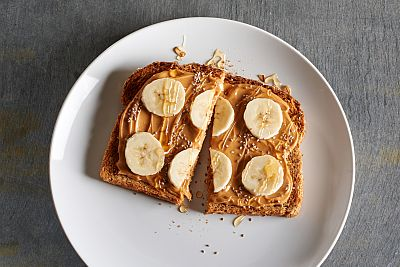
Get Recipe: Peanut Butter Power Toast
A well-rounded breakfast includes a combination of carbohydrates for energy (think oatmeal or whole wheat toast), protein to keep you full for longer (like peanut butter, yogurt, or eggs), and a healthy fat as an extra source of energy (like avocado or nuts).
For carbs, choose ones made from whole wheat or other whole grains. Whole fruit is great. For cereals and other packaged foods, pay close attention to labels—“wheat” isn’t the same as “whole wheat” or “whole grain.”
“Bonus points if you include fiber in your child’s breakfast,” says Lauren. “Fiber will help their body break down carbs slower and release glucose into the bloodstream at a steadier rate, leading to a reduced risk of that ‘sugar rush’ and ‘crash.’”
Q: What specific types of foods are best for breakfast? And what if my child really dislikes “traditional” breakfast foods?
Lauren often has yogurt with strawberry jam and whole wheat waffles. “The yogurt helps me stay full until lunch, and the waffles are a nice source of quick energy to get me focused,” she says.
But breakfast doesn’t have to be traditional breakfast foods.
Smoothies packed with fruit, fiber like ground flax seeds, veggies, and yogurt can make for a great first meal of the day. So can leftovers from the night before. There’s no reason your child can’t have that half a hamburger on a whole wheat bun they couldn’t finish the night before.
“Eggs, bacon, and pancakes are not the only breakfast foods out there,” she says. “Find out what your child likes to eat, even if it’s not a classic breakfast food, and let them have it.”
Q: What foods are better to include less frequently at breakfast?
 “Because high sugar foods will make blood sugar spike and give them a short burst rather than sustained energy for the long haul, it’s best not to eat only those types of foods at every breakfast,” Lauren says. But there is a way for your children to enjoy their favorites that may be a little higher in sugar.
“Because high sugar foods will make blood sugar spike and give them a short burst rather than sustained energy for the long haul, it’s best not to eat only those types of foods at every breakfast,” Lauren says. But there is a way for your children to enjoy their favorites that may be a little higher in sugar.
“I wouldn’t focus on cutting things out of the diet,” she says. “Instead, focus on keeping serving sizes of sugary items smaller.” Mix in some fiber, she says, from a lower sugar whole grain cereal or whole fruit. And add some protein, like cottage cheese or a cheese stick on the side, to provide that balance and further slowdown that sugar rush and crash.
“There shouldn’t be good foods and bad foods,” she says, “but you can navigate them away from those sugary foods.”
Processed meats with saturated fats and sodium like bacon and sausage should also be on your list of things that are better off as occasional, not everyday, breakfast items.
As for caffeine in the form of a morning coffee, young children should not have it. As kids approach adult age, however, caffeine in moderation can be a part of their morning meal.
Q: We just don’t seem to have time for breakfast. What are some quick and convenient solutions?
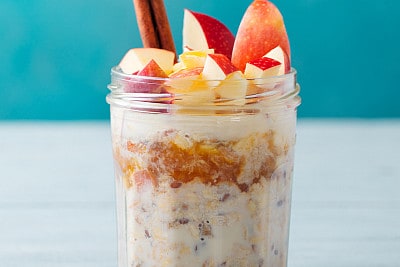
Get Recipe: Apple Pie Overnight Oats
If you’re pressed for time in the morning, know you’re far from alone. There are plenty of great options to help.
Healthy prepackaged items can be your best friend. These might include yogurt, cottage cheese, whole fruit bars, whole grain energy bars or cereal bars, cheese sticks and cubes, frozen breakfast items like tacos or waffles (just be on the lookout for added sodium or sugars), and prepackaged cereals.
Another good option is to do meal-prep if you have time the day or night before or over the weekend. You can make overnight oats with milk and fruit, or breakfast “bento boxes” ready to go with prepackaged items. Something as simple as a banana or a package of dried fruit, nuts, and seeds is also a good grab and go.
Q: What about school breakfast (if offered)? Is it a good alternative?
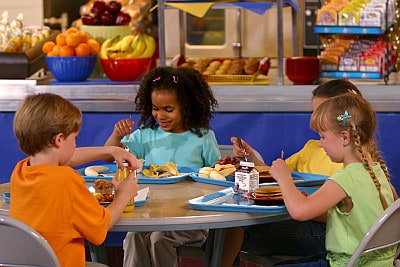 Most public schools offer breakfast. Sometimes they offer breakfast in the classroom. Other times, it’s a “second chance breakfast” if your student comes in late. Some districts offer free breakfast to any student, so check your district’s child nutrition website.
Most public schools offer breakfast. Sometimes they offer breakfast in the classroom. Other times, it’s a “second chance breakfast” if your student comes in late. Some districts offer free breakfast to any student, so check your district’s child nutrition website.
School breakfast is a fantastic alternative, even in addition to breakfast you serve at home. Most districts offer an entrée like cereal or a hot sandwich, a fruit, and a milk.
Also, know the Pop-Tarts® on the school menu aren’t the Pop-Tarts in the grocery store. School meals are regulated by the government and have to follow specific dietary guidelines, so foods with the same name have less sugar and more whole grains than those at the store.
School breakfast can be an excellent way to ensure your child is getting the balanced breakfast they need to stay energized and learning during the day. Also, since National School Breakfast Week is in early March. School districts may have additional fun events and offerings like food tastings, so it’s a great time to try out school breakfast if your child hasn’t before.
What’s a Parent to Do? What are the top breakfast ‘takeaways’ and ‘recommendations’ for busy parents?
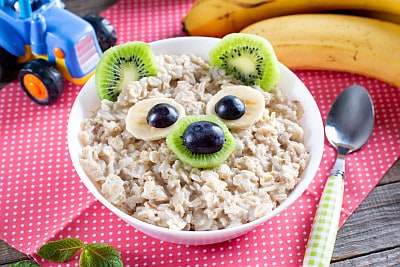 Try the following additional tips to make breakfast a smoother process:
Try the following additional tips to make breakfast a smoother process:
Ask your child what they like to eat. Your child is more likely to eat breakfast when it’s a food they really enjoy. Let them choose, help them pick out foods at the grocery store, or help prepare breakfast in the morning or night before.
Remind your child about school breakfast. Even if your family doesn’t regularly partake in school breakfasts, it’s a great alternative for busy mornings or if your child needs extra fuel. Read over the menu together to get your child excited.
Pack breakfast while you’re packing lunch. It’s not as common for parents to pack breakfast for school, but why not? Add a banana or baggie of Cheerios to your child’s lunch kit the night before, then they can eat it first thing at school, if their school allows.
Set an early bedtime. If your child gets enough sleep and wakes up not in a rush, they’ll be more likely to have enough time to eat a healthy breakfast at home.
Test out creative breakfast ideas. Try dipping a banana in yogurt, rolling it in crushed cereal, then freezing for a tasty morning treat. The internet is full of fun and healthy ideas. And listen to our short podcast “Making Healthy Food Fun for Kids” for more ideas.
Do food prep the night before. Good items to prep ahead of time include sliced up fruit, hard-boiled eggs, and baked whole wheat muffins. Overnight oats with your child’s favorite add-ins is a favorite for many.
Overall, Lauren says, do your best and don’t beat yourself up if your family isn’t eating a home-cooked breakfast around the table every morning. “Sometimes it’s just a struggle to get kids to school,” she says. “It’s fine to eat in the car or have breakfast once you get to school. We just want kids to eat.”
Lauren Crain is a Registered Dietitian and part of Aramark’s Nutrition Network—a community of dietitians within Aramark Student Nutrition. The Nutrition Network connects and engages Aramark Student Nutrition RDNs and other nutrition experts in ways that benefit school students, parents and caregivers, and their district’s health and wellbeing initiatives.
Note: Since everyone’s health history and nutritional needs are so different, please make sure that you talk with your doctor and a registered dietitian to get advice about the diet and exercise plan that‘s right for you.

